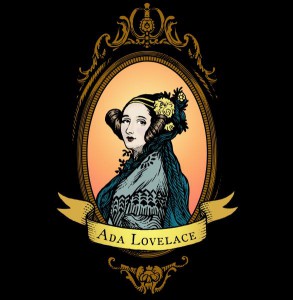16th October 2012 New Delhi, India
Inspiring women in science
 Today is Ada Lovelace day. If you’re wondering who Ada Lovelace is, she was a pioneering computer programmer and contemporary of (the potentially better known) Charles Babbage. As Suw Charman-Anderson and Helen Arney write on the Guardian’s science blogs, today is a chance to celebrate the “unsung heroines of science, technology, engineering and mathematics (STEM)” and so help inspire the next generation of female scientists.
Today is Ada Lovelace day. If you’re wondering who Ada Lovelace is, she was a pioneering computer programmer and contemporary of (the potentially better known) Charles Babbage. As Suw Charman-Anderson and Helen Arney write on the Guardian’s science blogs, today is a chance to celebrate the “unsung heroines of science, technology, engineering and mathematics (STEM)” and so help inspire the next generation of female scientists.
The opening line of this blog perhaps demonstrates why this necessary… They’ve asked people to share stories of women they’ve been inspired by. The idea is to collect all of these together at the FindingAda database and create a new set of role models for women considering a career in science.
We did a straw poll in the SIN India team yesterday and some familiar names came up from Rosalind Franklin to Marie Curie. Or to bring us up to date, Professor Dame Athene Donald, who Mark enjoyed meeting at the Unesco/L’Oreal Prize in Paris a few years ago. Some perhaps a little less well known included Tessy Thomas, the ‘Missile Woman’, or Janaki Ammal, a botanist and Founding Fellow of the Indian Academy of Sciences. Our team are also enthusiastic historians! We had Hypatia of Alexandria, mathematician and defender of reason, and (as a chemist this is my personal suggestion) Mary the Jewess, early inventor of cutting edge chemical equipment.
Perhaps most pertinent today is the story of Anandibais Joshee. As the first Indian woman to train as a doctor (qualifying at 21!) and one of the first to study in the West, she was a true pioneer and a talented woman. Sadly, dying from TB just a year later, she is a poignant reminder of the huge loss to the world of not making the most of all the talented people we have.
Impressive as all the above are, I think inspiration tends to come from closer to home, from the people around you. Very recently my old academic supervisor and someone who taught me a lot, Charlotte Williams, got promoted to professor at Imperial College London. Talking about her achievement, she made this point and chose to highlight the influence a professor she first met as a student had had on her career.
From the personal to the national – inspiring young women to study science is an issue countries grapple with. I think I first became properly aware of this in the UK when my old Chemistry Department at York became the first to be awarded an Athena Swan Gold Award for Women in Science (to be scrupulously fair, Edinburgh now also has a Gold Award). The Awards are one of the UK’s mechanisms to advance the representation of women in STEM (you can read more the Royal Society and the Royal Academy of Engineering websites). At the Indo-UK Science & Innovation Council in April this year, Professor Godbole spoke powerfully about the importance of this agenda and some of India’s own initiatives. So it’s a challenge both countries are seeking to address. UK readers may be interested to know that “Science and Technology for Inclusive Innovation: [the] role of women” was the theme of this year’s 99th Indian Science Congress this year.
Finally, if you’re reading this and have your own inspiration, please let us know in the comment section and then go and let FindingAda know too!
Update 22/10 – as part of the initative, there’s also a drive afoot to update wikipedia – join in!
Many thanks for the comment Arbab, and for the update from the research community in Pakistan perspective
In our Pakistan trand is gradually be changed male dominant society to equal gender functionality, due to high effort of our Womens in all fields spacially in social science and Medical Science, Computer technology, Engeering and Mathametical Sciences. It is natural process. Due to use of machanary in human life more potentialised the women.
Glad you liked it Revathi. As a practicing researcher, please tell us about who inspred you!
Great…… and happy to see this in my inbox….. since I am a research scholar in botany field I am really needs to know more regarding this and I like to be an outermost updater and it is my inspiring message also definitely it will stimulate my science thirst……
Open revolt here in the Bangalore office at my decision to edit out mention of Florence Nightingale and her influence on the early use of statistics. To keep the peace, you can find out more at :
http://plus.maths.org/content/florence-nightingale-compassionate-statistician